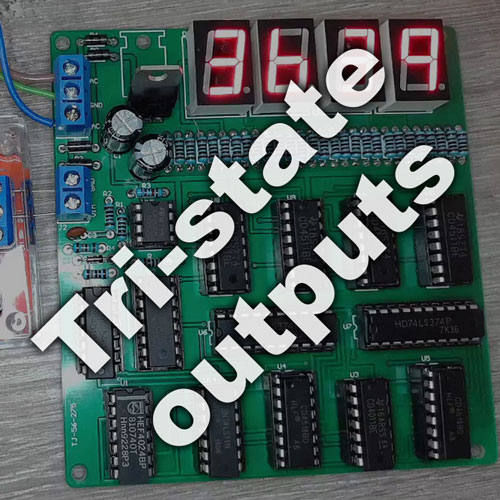How does binary logic work? Latch registers with tri-state outputs
Latch registers built from D flip-flops freeze changing data for display or processing. A DIY frequency counter uses CD4518 counters and two 74HC374 8-bit latches with tri-state outputs to hold the measured count while counters reset. Mains-derived full-wave reference pulses drive a CD4024 divider and logic gating for 100 Hz (or 120 Hz) timing. Tri-state outputs, let the latch bus go high impedance.
Continue reading →Protocol Stacks: SIP and H.323
SIP - protocol for multimedia telephony SDP, SIP-T and SIGTRAN - traditional telephony legacy SIGTRAN architecture
Continue reading →Building a custom electric guitar from a DIY kit
Building a custom electric guitar from a DIY kit involves using a Harley-Benton kit with quality components. The process includes decoupage techniques using rice paper and lacquer for a unique finish. Conductive graphite paint is made for shielding, and strategic assembly of parts like the neck and pick-guard is crucial. Shielding with copper foil is debated for tone impact, but enhances performance. The final product is a functional and visually appealing instrument.
Continue reading →H.323 Standard
H.323 is a standard for multimedia communications, facilitating real-time voice and video transmission over IP networks. It includes security enhancements, such as H.235 for encryption and user authentication. The standard has evolved with new versions adding improved protocols for video, audio, and data exchange. T.120 is related, providing multipoint conferencing capabilities, file sharing, and real-time data exchange.
Continue reading →Matrix Connection: Few Pins, Many Options
Multiplexing techniques allow a microcontroller with limited pins to control many outputs by using decoders, demultiplexers, or shift registers. Matrix arrangements of LEDs or relays multiply output options, with persistence of vision helping simulate simultaneous activation. Designs like electronic timers and RGB running lights utilize these methods efficiently.
Continue reading →Telecommunication Protocols Overview: VoIP
Implementing VoIP networks involves protocols like H.323 for digital exchange, SIP for multimedia conferencing, and MGCP for integrating IP telephony with PSTN networks, each tailored to specific network needs.
Continue reading →Counting pulses and seconds without MCU
Two stopwatches use CD4518/CD40192 counters, NE555 timers, and logic gates for forward/backward counting. They demonstrate setting time, pausing, and resetting without microcontrollers.
Continue reading →Review, teardown, and testing of APV-35-24 Mean Well power supply
Here’s an inside look at the Mean Well APV-35-24 power supply, tested under real conditions. We explore startup, load shifts, ripple, noise, and thermal data, plus its built-in overload safeguard. Whether for a new project or PSU curiosity, our teardown reveals what this 24 V, 1.5 A unit can handle and how it holds up.
Continue reading →How to make a PCB
Want to build your own custom circuit board? This hands-on guide shows an easy, step-by-step approach for designing and transferring layouts, prepping a fiberglass blank, and etching a single-sided PCB. Using KiCad 7.0 and everyday items like an iron, you’ll learn tips for printing, drilling, and finishing your project with solder paste. Get pro-quality results on a DIY budget—start making PCBs today!
Continue reading →Digital Transmission Systems: Eye Diagram and Bit Error Ratio
Eye diagrams visualize signal quality; wider "eye openings" mean better integrity. Bit Error Ratio (BER) measures error rates but requires downtime and may overlook error bursts. Advanced in-service monitoring enhances system evaluation without disrupting operations.
Continue reading →The amazing secrets of Krank Distortus Maximus
The Krank Distortus Maximus pedal uses a single LM386N3 chip and minimal components to emulate high-gain, tube-like tones of Krank Amplifiers. Its simple yet sophisticated circuit showcases clever engineering in guitar effects design.
Continue reading →Review, teardown, and testing of HLG-185H-24A Mean Well power supply
The HLG-185H-24A Mean Well power supply delivers a stable 24V DC output up to 7.8A, accepting AC input from 90-305V and DC input from 127-431V. It features adjustable voltage and current, high efficiency (~93.5%), active PFC (power factor 0.98), and protections against thermal issues, overload, and overvoltage. Testing showed excellent voltage stability (<0.34% variation), low ripple, good dynamic response, effective overload protection, and safe thermal performance at full load. It's robust, efficient, and suitable for various applications beyond LED lighting.
Continue reading →Measurements in digital transmission systems
Explores error measurement in digital transmission systems: BER and BLER. BER quantifies bit errors but requires communication interruption to measure. BLER with CRC enables error detection during normal operation without disruption.
Continue reading →Brown Sound in a Box
Eddie Van Halen's "Brown Sound": tracing guitar evolution from jazz to solid-body guitars. Highlights his Frankenstrat Superstrat, unique amp and effects setup, and building a pedal to emulate his tone—imperfections add character.
Continue reading →Methods of Implementing DC PLC Protocols
DC PLC protocols enable power line communication, crucial for solar panel monitoring and industrial motor control. The G3-PLC protocol, maintained by G3-Alliance, requires certified chipsets for signal processing and encryption, with major producers like Maxim Integrated and STMicroelectronics. PLC-Lite utilizes TI's processors. IEEE 2847-2021, backed by a South Korean startup, lacks dedicated chips, relying on software. Specialized chipsets are cost-effective, except for IEEE 2847-2021.
Continue reading →Old School Digital Frequency Counter
Build a digital frequency counter without a microcontroller. Convert waveforms to pulses via diodes. Use an MC14553B counter and CD4017 sequencer. Measure frequency by counting pulses over one second.
Continue reading →Review, teardown, and testing of ERPF-400-24 Mean Well power supply
The ERPF-400-24 Mean Well power supply features a 24V DC output with a 16.7A current, supporting AC inputs from 90 to 264V, with reduced power output between 90-200V. It's housed in a metal case with a perforated lid, offering voltage adjustment and active PFC. Testing revealed stable output voltage, low noise, and adequate dynamic performance. Build quality is decent, but compound application has gaps, affecting moisture protection. The unit operates safely up to 100% load, requiring added water protection for outdoor use.
Continue reading →Telecommunication protocols application interaction
Explore application communication in the OSI model via data encapsulation. Learn about LANs vs. WANs, MAC protocols, Ethernet and Wi-Fi dominance, network topologies, transmission media, and wireless security.
Continue reading →Why there are so many diverse Tube Screamers?
Maxon's OD808 (1979), developed by Susumu Tamura, became the Ibanez TS808 Tube Screamer, based on the BOSS OD-1 with a tone control added. It inspired many overdrive pedals that enhance amp overdrive by emphasizing certain frequencies.
Continue reading →Communication protocols for PLC on DC lines
DC Power Line Communication (PLC) systems face challenges because power cables aren't designed for communication frequencies, leading to signal reflections and interference. Solutions include limiting data rates, using OFDM modulation, and selecting suitable frequencies. Protocols like PLC-G3 (up to 45 kbps, 1300 ft range) are standardized and secure, used in green energy systems. PLC-Lite (up to 21 kbps, 130 ft range) is cost-effective but limited. IEEE 2847-2021 offers longer range but lower speeds. DC PLCs are vital in solar energy and industry, where cost-effectiveness outweighs high data rates.
Continue reading →


















